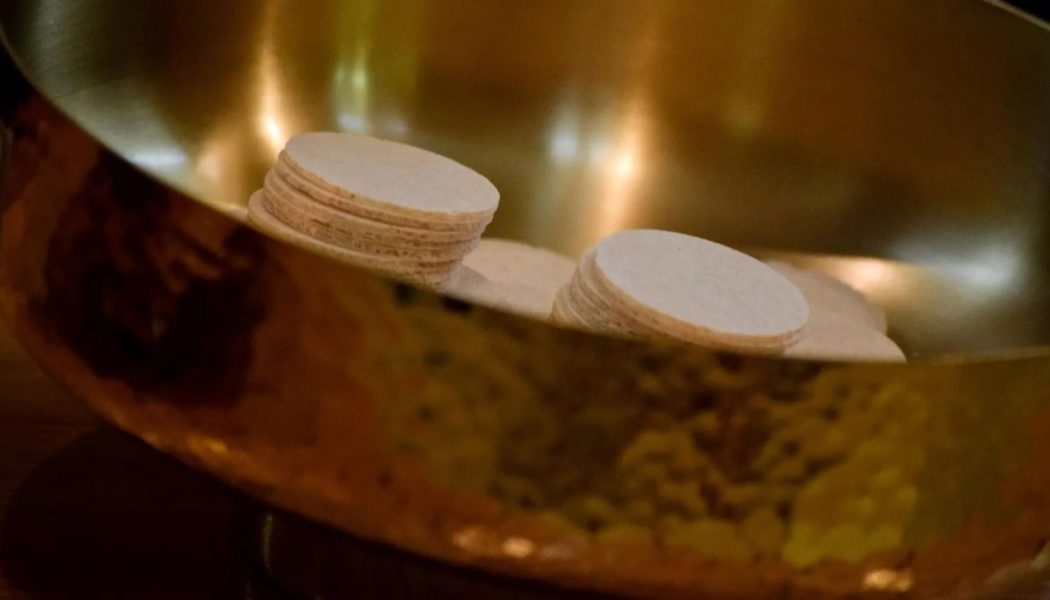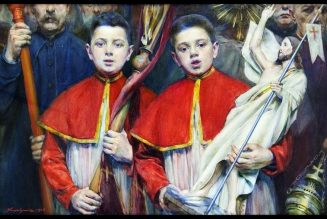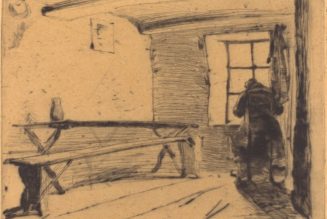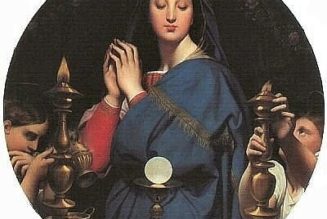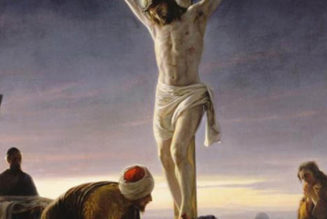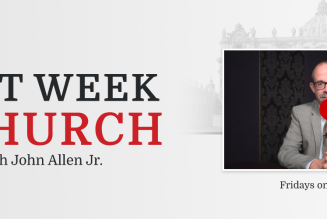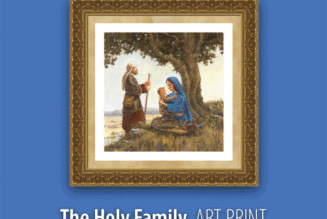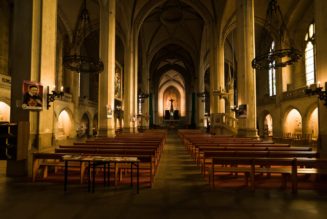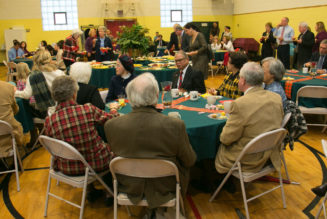
When Jesus said “I am the way,” he wasn’t kidding. Last week, on Trinity Sunday, he promised us that we can participate in the life of the Trinity. This Sunday Jesus shows us that he is our way into that life — literally.
The Church in America this Sunday celebrates Corpus Christi Sunday, the Solemnity of the Body and Blood of Christ, Year A, which the worldwide Catholic Church celebrates the previous Thursday. It’s the day we celebrate the sacrament that unites our body, blood, and soul with the body, blood, soul and divinity of the Second Person of the Blessed Trinity, Jesus Christ.
Jesus says it forthrightly: We get to the Father with him, through him, and in him, by partaking of his very flesh and blood.
“Just as the living Father sent me and I have life because of the Father, so also the one who feeds on me will have life because of me,” says Jesus.
On Trinity Sunday, we celebrate the fact that he is one God with the Father and the Holy Spirit. On Corpus Christi, we celebrate the fact that we become one with him at every Mass. “Unless you eat the flesh of the Son of Man and drink his blood, you do not have life within you,” he says in the Gospel for the day, and adds, emphatically, “My flesh is true food and my blood is true drink.”
It seems excessive and extreme — and it is, because love is excessive and extreme.
“This is what lovers do,” says St. John Chrysostom. “When they see those whom they love desiring what belongs to strangers and despising their own, they give what belongs to themselves and so persuade them to turn away from the gifts of those others.”
That makes God seem like a jealous parent who doesn’t want his children to stray away from the family, and so tries to one-up rival suitors to win us over.
Exactly.
The readings for Corpus Christi Sunday show just how far God has gone for us.
Consider a few examples from our First Reading from Deuteronomy. In it, Moses is recalling what God does, based on all that has happened since he led God’s chosen people out of slavery in Egypt:
- God gives us food: The people in the desert grumbled, impertinently, for bread. God gave them what they wanted, sending Manna.
- He gives us salvation: The people were attacked by serpents, symbols of sin. So God delivered them — by giving them a bronze serpent to gaze upon, a shinier symbol of sin.
- He is present to us: The people impatiently demanded water from God. So He gave them that, too, in a fountain from a rock.
Our God is a God who is willing to give in, even to our impertinent demands. And in each of these cases, Jesus did the Old Testament one better.
- He becomes our food: Satan tempted Jesus to make bread from stones, and Jesus quoted Sunday’s First Reading to tell him No. But then Jesus did even more: He turned bread into his very body and blood for us, feeding us with himself to make us “like gods,” fulfilling the false promise Satan had made in the Garden of Eden.
- He becomes our salvation: Jesus said that he would himself be “lifted up” like the bronze serpent; and he was, on the cross for our sins, as we see on the crucifix above the altar — and in the chalice and monstrance we gaze on, too. Moses’s rebellious people chose to kneel before the shiny calf rather than wait on God. But now God has satisfied our desire and given us the shiny chalice and monstrance to kneel before, with him in it.
- He is present to us: God gave his people water from a rock, yes — but that rock “is Jesus,” says St. Paul in First Corinthians Chapter 10. Jesus Christ himself gives us water that wells up to eternal life — the water of baptism that continues the process of making us like God.
So, yes, God is like a lover who spoils his children; but he is also wise. Speaking of First Corinthians Chapter 10 …
In the Second Reading, St. Paul points out the consequences of communion.
“The chalice of blessing that we bless, is it not a participation in the blood of Christ?” St. Paul asks. “The bread that we break, is it not a participation in the body of Christ?”
That participation is quite literal.
“That chalice, or rather, what the chalice holds, consecrated by the word of God, is the blood of Christ,” St. Augustine explains. “If you have received worthily, you are what you received.”
Such a bold act can be very good, or very bad. But for those who have been to confession this year, or since their last mortal sin: “When Christ is eaten, life is eaten. Nor is he killed in order to be eaten, but he brings life to the dead. When he is eaten, he nourishes without diminishing,” Augustine says. “Let Christ be eaten; when eaten he lives because when slain he rose again.”
But those who have left the body of Christ through the separation of sin, or the sin of separation, Augustine says “receive the sacrament but to no avail — in fact to their harm — since the result is to increase their pain rather than to curtail the length of their punishment.”
The Catechism agrees.
In other words, God is indeed a Father who showers gifts on his children so abundantly it almost feels like he is spoiling them. But he takes his gifts so seriously that, once given, he holds us to the consequences.
And he is doing so to this day.
We are all “beggars for bread from God,” said St. Augustine. And just as he gave his people what they begged for in the desert, he gives us what we want, too.

 Bishop Robert Barron’s new book This Is My Body is a shorter take on his longer (but still relatively brief) book Eucharist. Both focus on three theological movements in the Eucharist.
Bishop Robert Barron’s new book This Is My Body is a shorter take on his longer (but still relatively brief) book Eucharist. Both focus on three theological movements in the Eucharist.
First, Bishop Barron sees “The Eucharist as Sacred Meal.” All of salvation history, he says, “creation, the fall, the formation of Israel, the Passover to freedom, the vision of Isaiah’s holy mountain , the gracious table fellowship of Jesus” — as well as the heavenly banquet — “Is made present in the Mass.” So, God gives us the Eucharist as our food today, with the same consequences it had in ages past.
Second, Bishop Barron addresses “The Eucharist as Sacrifice.” He says that “The sacrifice of the Mass is a participation in this great eternal act by which Jesus entered on our behalf into the heavenly sanctuary with his own blood and returned bearing the forgiveness of the Father.” And those who come to Mass “are not simply witnessing the event of the cross; they are sharing in it.”
Third, Bishop Barron stresses the Real Presence of Jesus Christ in the Eucharist, quoting Flannery O’Connor, who said, “If it’s only a symbol, to hell with it!” Barron recounts fascinating history to describe how the Church understands that Jesus is really, truly present in the sacrament, and how various philosophical schools grappled with that face. He concludes with great advice for Corpus Christi 2023:
“I tell people to be very careful when they approach the Eucharist,” he says. “Were the elements simply symbols — inventions of our spiritual creativity and desire — they would pose no particular threat. But since they are the power and presence of God, they will change the one who consumes them.”
We have a good Father doesn’t hold back his generosity from his children, but goes to the extremes of love. He doesn’t just feed us, save us and stay with us; he incorporates us into his very life. He fully expects us to love him also — and he expects that our love will go to extremes, also.
